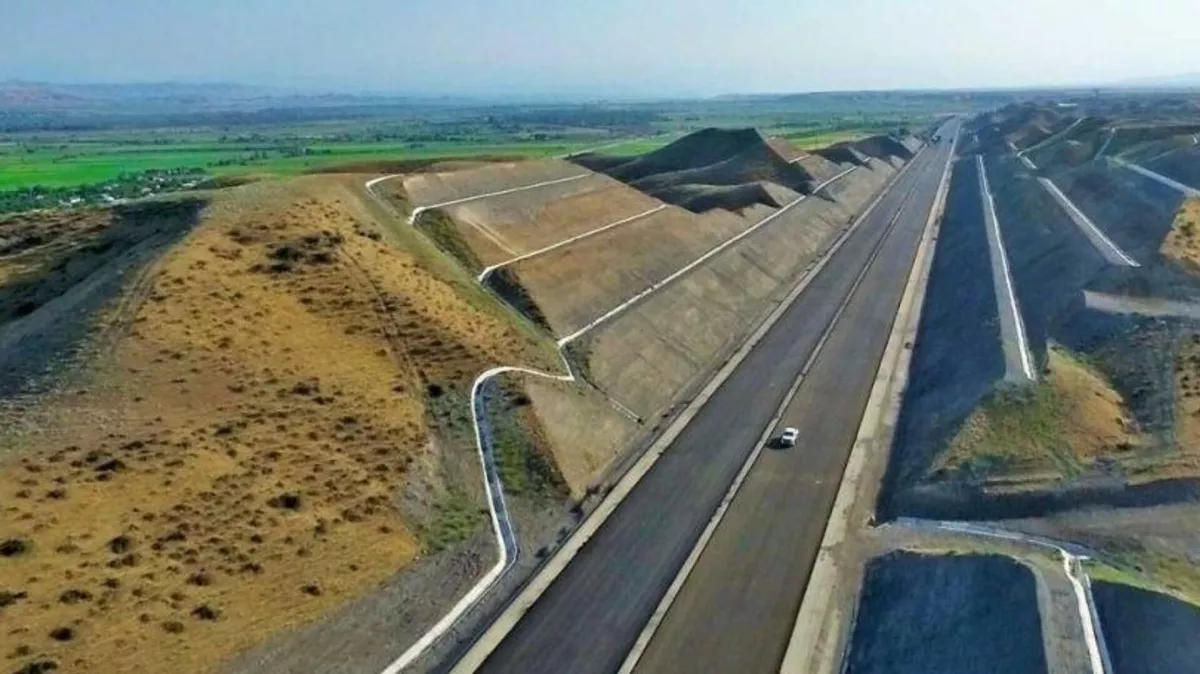Türkiye and Azerbaijan connect the rails Zangezur Corridor gains momentum
Over the past three years, Azerbaijan has been steadily implementing projects to develop the railway and road infrastructure of the Zangezur Corridor, strengthening its position as a regional transport and logistics hub. According to recent reports in Turkish media, work has begun on the Kars-Iğdır-Nakhchivan railway project in Türkiye. Within the next five years, construction is set to be completed on a key segment of the Zangezur Corridor—a 223.9 km railway line linking Türkiye’s railway network with the Nakhchivan Autonomous Republic (NAR).
Today, most global power centres recognise Azerbaijan as the key beneficiary of the transformations in the transport and logistics landscape of the South Caucasus over the past four years. European states, Russia, Türkiye, China, and Central Asian countries are actively promoting various initiatives to establish transit routes through Azerbaijan as part of the Middle Corridor. This work is progressing rapidly, including the operation of the Trans-Caspian International Transport Route (TITR) for the past seven years—a multimodal maritime and railway corridor that also involves cargo transshipment via the Baku-Tbilisi-Kars (BTK) railway line.

Given the rapidly growing volume of cargo transshipment along the East-West route, Azerbaijan completed the modernization of the Georgian section of the Baku-Tbilisi-Kars (BTK) railway last year, increasing its capacity from 1 to 5 million tonnes of cargo per year. However, as the potential for further growth in cargo transportation along the Middle Corridor increases, even greater transshipment capacities will be required. Similar demand is also forecasted for the "North-South" project, considering plans to expand Russian-Iranian cargo transit. Accordingly, the need for additional capacity for transit through Azerbaijan towards Türkiye and Iran will rise significantly. This is why, as part of its transport and logistics diversification policy following the victorious 44-day Patriotic War, Azerbaijan initiated the construction of road infrastructure and the laying of railway tracks in the East Zangezur Economic Region.
At a meeting held in late January this year to discuss transport development, President of Azerbaijan Ilham Aliyev reminded that despite Armenia's destructive stance, Azerbaijan is taking practical steps to open the Zangezur Corridor.
“The Zangezur corridor is already an accepted expression, an accepted term in the world. Of course, we are taking practical steps to open this corridor. Some 60 per cent of the Horadiz-Aghband railway has been completed, and 94 per cent of the Barda-Aghdam railway has been constructed,” the president stated. “A corresponding agreement has been reached with the Islamic Republic of Iran and a project is now underway on the construction of a road bridge bypassing Armenia. It will probably be completed this year.”
Azerbaijan is independently financing the construction of the cross-border international Horadiz-Aghband railway line infrastructure. More than half of the 110.4-kilometre single-track railway section, passing through the Jabrayil and Zangilan districts to the border settlement of Aghband, has already been laid. As part of this project, three tunnels, dozens of bridges, eight railway stations, three tunnels, 47 bridges, five overpasses, seven underground pedestrian crossings, various galleries and retaining walls, as well as other engineering structures of various purposes are planned.
Additionally, the project involves the design of 110.4 km of electrical supply, communication, and signalling systems. The Horadiz-Aghband railway project is being implemented in a challenging mountainous terrain with the involvement of Turkish contractors and the use of advanced technologies. The construction and installation work is being carried out in three stages and are expected to be completed by the end of this year or the beginning of next year.

"Approximately 60% of the work on the construction of the Horadiz-Aghband railway line has been completed: the work in one of the tunnels has been fully finished, and drilling is underway for the second tunnel. All design work has been completed, and construction efforts continue," said Rovshan Rustamov, Chairman of the Closed Joint-Stock Company Azerbaijan Railways (ADY), in late 2024.
As is well known, following the capitulation on November 10, 2020, Armenia undertook commitments clearly stating that transportation links must be established between mainland Azerbaijan and its integral part—the Nakhchivan Autonomous Republic (NAR). Subsequent studies determined that the 46-kilometre railway line from Aghband (Azerbaijan) to Yeraskh (Arazdeyen, Armenia) passes through the convenient Araz Plain, where the mild climate makes the line operational year-round. Its construction was estimated to cost approximately $230 million.
However, Baku and its partners in the implementation of the Zangezur Corridor also have alternative routing options in mind. Specifically, on March 11, 2022, the governments of Azerbaijan and Iran signed a memorandum to establish new communication links between the East Zangezur Economic Region and NAR through Iranian territory. The project includes the construction of a 55 km road and a parallel railway line from Imishli (Azerbaijan) to Parsabad (Iran), with the construction of four border bridges over the Araz River and the connection of both the railway and the road in Nakhchivan.
In October 2023, a joint ceremony with Iran was held near the settlement of Aghband in the Zangilan district for the laying of the foundation for a new road bridge and future border and customs infrastructure. The new bridge is a key component of the 123.5 km Horadiz-Jabrayil-Zangilan-Aghband road, which will eventually connect to the transport network of the Nakhchivan Autonomous Republic (NAR) and provide a route towards Türkiye. According to the Chairman of Azerbaijan Railways (ADY), Rovshan Rustamov, full design documentation is currently being developed for the reconstruction of the railway lines in NAR.

The Turkish transport vector is the next important section of the Zangezur Corridor. Last year, Turkish Minister of Transport and Infrastructure Abdulkadir Uraloğlu repeatedly announced the completion of preparatory work for the construction of the Turkish section—the Kars-Iğdır-Aralık-Dilucu railway, which will connect to the Nakhchivan Autonomous Republic (NAR) railway network.
According to recent information published in the Turkish newspaper Sabah, work has officially begun on the Kars-Iğdır-Nakhchivan railway project. "Construction work is planned to be completed within five years, which will ultimately reduce travel time between Kars and the Azerbaijan border checkpoint 'Dilucu' to just one and a half hours," the newspaper notes, calling the Kars-Iğdır-Nakhchivan railway "part of the modern Silk Road." As reported by the Turkish outlet, the primary work for the project has been assigned to two Turkish companies—Kalyon and Cengiz İnşaat—who have already mobilized hundreds of specialists, some of whom are working at the construction site in Iğdır. To accelerate the progress of the project, additional construction sites are planned to be established.
Earlier Turkish media reported that as part of this project, 10 bridges and 144 underground crossings will be built. The Kars-Iğdır-Nakhchivan railway will be designed for passenger train speeds of up to 160 km/h. The capacity of the new railway between Türkiye and the Nakhchivan Autonomous Republic (NAR) is planned to be 5.5 million passengers and 2 million tonnes of cargo per year. In the future, it is also planned to integrate this new "steel" route with the existing Baku-Tbilisi-Kars railway. With the opening of the new railway, the Turkish cities of Kars and Iğdır, as well as Nakhchivan, are expected to become major international trade hubs.








